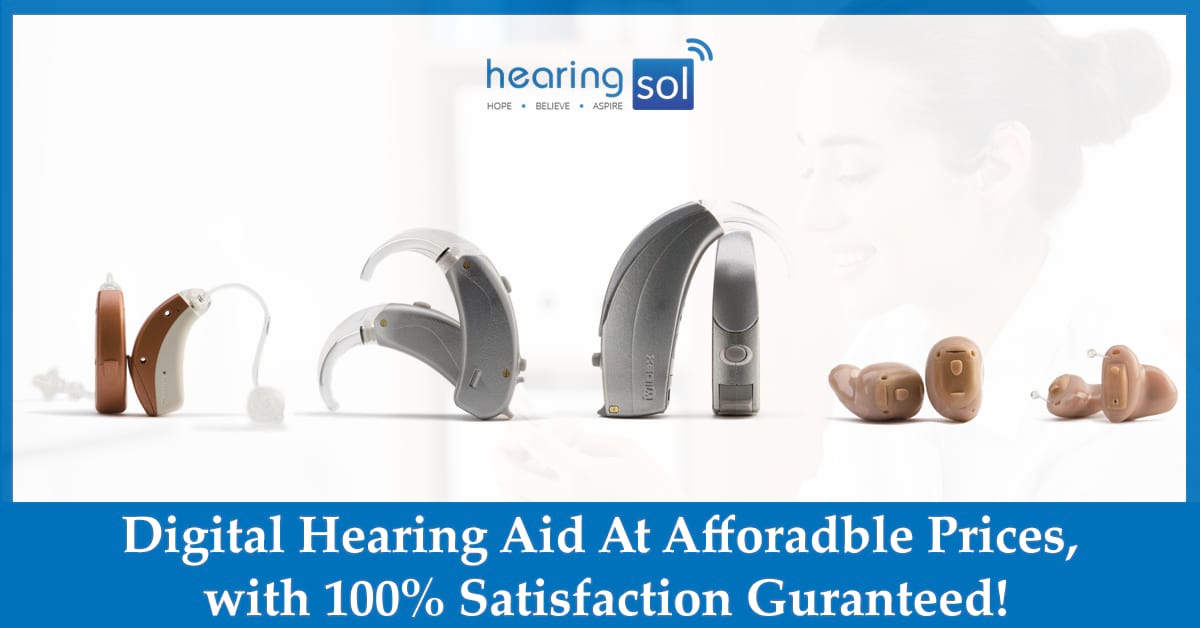
Nerve Deafness is also known as the sensorineural hearing loss which can be temporary or permanent. The main causes of sensorineural hearing loss are related to prematurity, genetics, exposure to loud noise, tumors, high dosage of medication, etc. In order to listen normally in sensorineural hearing loss, you need the best hearing aid for nerve deafness.
You can purchase the latest hearing aids at a fair price through HearingSol, If you need more information or you have a query about Hearing Aid or Hearing Loss, just give us a call on +91-9327901950. We are always here to help you.
If the sensorineural hearing loss is permanent, and the doctor fails to treat it as it may become unresponsive for the treatment methods, then wearing specific hearing aids is the ultimate option. Let’s discuss which type of hearing aids will help you to listen better in sensorineural hearing loss.
SNHL are of various types such as
Mild Hearing Loss
- Mild hearing loss is a loss of hearing between 25-40db. It can affect one ear or both the ears. The person suffering from this disorder is unable to catch sounds of these consonants “f”, ”t” and “p”.
- People with these disorders face difficulties in communicating in a noisy environment.
Moderate Hearing Loss
- Moderate hearing loss is a loss of hearing between 40-70db. The person suffering from this disorder is unable to hear conversations.
- Without hearing aid the person cannot communicate.
Severe Hearing Loss
- Severe hearing loss is a loss of hearing loss between 70-94db.
- The person suffering from this disorder try to read the lips of another person who is trying to communicate.
- The specialist recommends powerful hearing aids to the patient.
- Loud horns and sounds seem the patient as a normal sound.
Profound Hearing Loss
- Profound hearing loss is a loss of hearing from 95db or more.
- The person suffering from this disorder try to read lips or use sign language to communicate.
- The specialist recommends the use of powerful hearing aids or cochlear implant.
Types of Hearing Aids for Sensorineural Hearing Loss or nerve deafness
There are two basic types of hearing aids that may be prescribed for mild to severe sensorineural hearing loss:
ITE (In The Ear)
80% of people wearing hearing aids use In the ear type of aid which is located in the external portion of the ear. Some styles are designed to fit deeply into the ear with no portion in the cochlea (external ear). These types of hearing aids are barely noticeable, and because of their design, they transmit less wind noise to the wearer. It is highly benefitted to the sportsperson, salesmen, and people traveling outside for a living.
BTEs (Behind the ear)
Generally, BTEs are popular among children and people with moderate to profound hearing loss. They consist of two parts-Firstly, the small case that fits behind the ear. Secondly, the custom earmold that fits inside the ear. However, the earmold will need to be replaced as one person grows.
Cochlear Implants
Cochlear Implants are used when hearing aids are not effective. Hence cochlear implants are used to bypass the damaged portion of the inner ear and deliver impulses directly to the auditory nerve. They consist of both external as well as an internal component.
The Internal Component is implanted in the bone under the skin behind the ear during a surgical procedure. The External Component is called a sound processor and is worn behind the ear. These two parts are connected via a magnet from the processor to the implant and further to the radio frequency transmitter.
You may read: Is cochlear implant the same as hearing aid
Hearing Aid Adjustment and Cochlear Implant Mapping
BTE and ITE hearing aids may need to be adjusted by your audiologist (+91-9327901950). Don’t be surprised to discover that you will need to schedule a time for a follow-up visit. An audiologist will adjust your cochlear implants using a process referred to as “mapping”. Keep a journal on how long you wore your hearing aids and what issues you had with them. As it will further help in the adjustment process to go smoothly.
Remember, your audiologist is ‘your partner in crime’, who will guide you with the best treatment.

